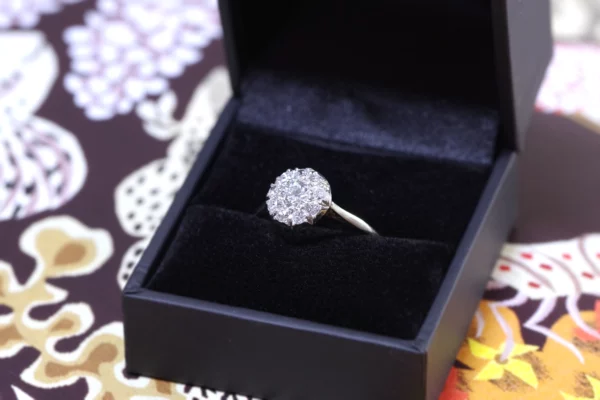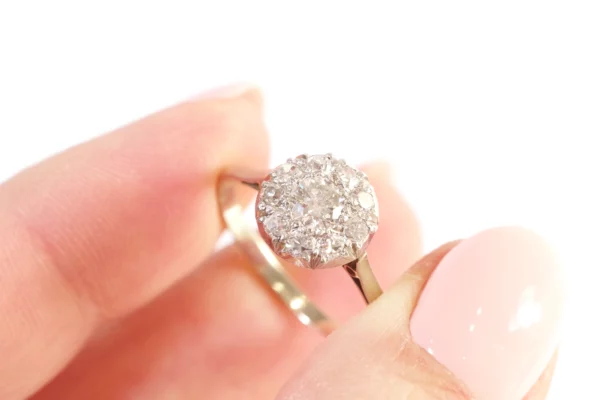297 Products
-
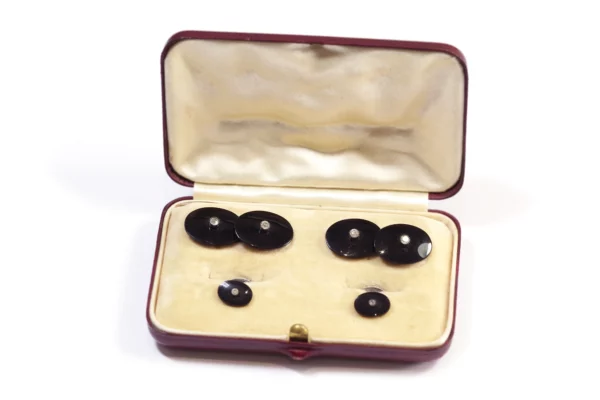
 200,00€
200,00€Art Deco onyx cufflinks in silver. Pairs of onyx cufflinks, oval-shaped, decorated with a paste stone imitating diamond in the center. Mounted on silver, they are matched by two collar buttons. The set is sold in its original leather case. Pair of cufflinks, early 20th century, Art Deco, France.
Boar hallmark and illegible goldsmith’s hallmark.
Cufflink dimensions: 15 x 11 mm
Dimensions of collar buttons: 9 x 6 mmNote : sold in the original box
Condition: oxidized, small missing part behind one of the cufflinksCufflinks weight: 4.22 gr
Collar buttons weight : 1.52 gr -
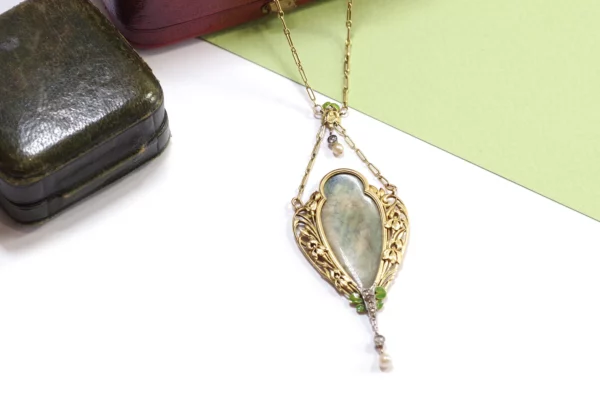
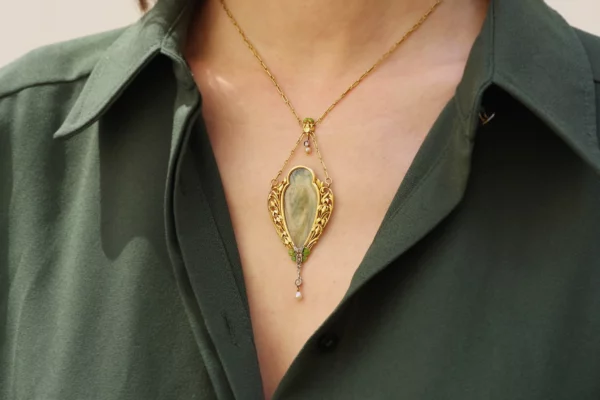 2800,00€
2800,00€French Art Nouveau iris water lilies necklace in 18 karat yellow gold. Lovely Art Nouveau necklace featuring a pendant enclosing a miniature in a frame decorated with irises and water lilies. The miniature depicts a ghostly woman near a satyr-headed fountain. The blue and green colors are partially washed out and faded, giving the whole a mossy agate appearance. The pendant is held by two chains joined by an iris decorated with a rose-cut diamond and a fine pearl. Green varnish highlights decorate the pendant. The lower part is set with rose-cut diamonds and a tassel with diamonds and natural pearls. Art Nouveau pendant, circa 1900, France.
Eagle head and rhinoceros hallmarks (French State hallmark for 18 karat gold)
Total length of necklace: 39.5 cm
Pendant dimensions: 8 x 3.2 cmCondition: partially faded miniature, clasp changed, later green varnish (can be removed with nail polish remover)
Weight : 16.60 gr
*The antique box is not sold with the jewel*
-
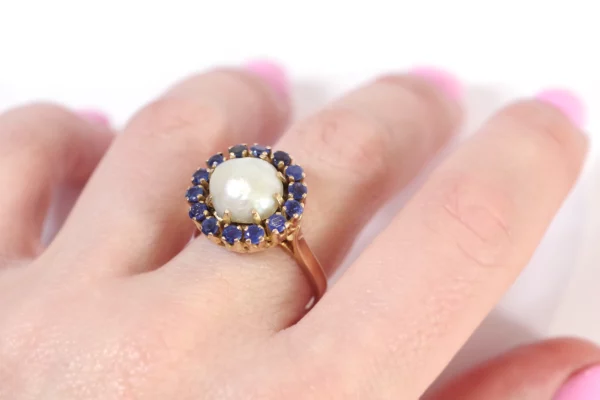
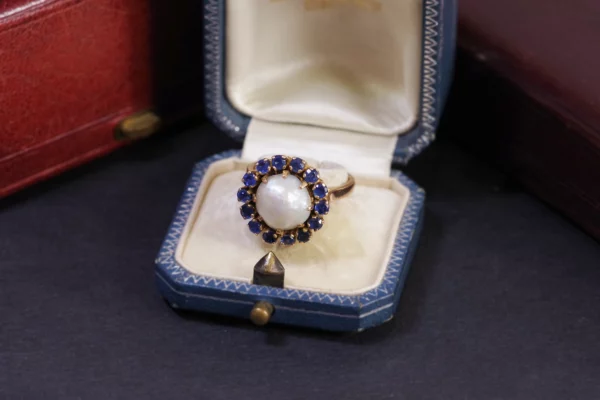 1250,00€
1250,00€Sapphire pearl cocktail ring in 18 karat (750) yellow gold. Cocktail ring centered on a 9 mm-diameter flat-bottomed pearl surrounded by 14 natural blue round sapphires. The ring has a large openwork basket 8 mm high. Retro ring, circa 1940.
Owl hallmark (french state hallmark for 18 karat gold)
Finger circumference: 55 UE or 7.25 (can be changed)
Ring head diameter: 16 mm
Basket height: 12 mm (with pearl); 8 mm (without pearl)Total estimated sapphire weight: 1.10 carats
Condition: light scratches
Weight : 8.10 gr
*The antique box is not sold with the jewel*
-
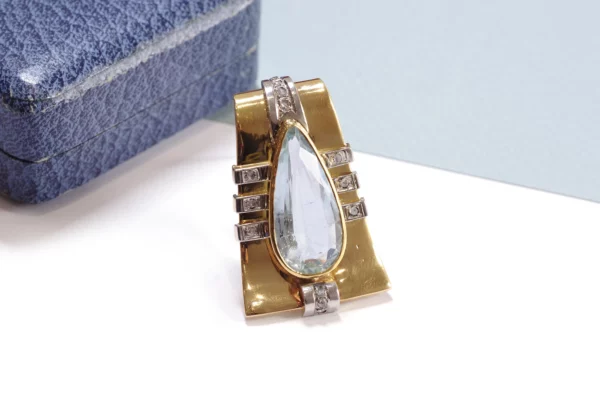
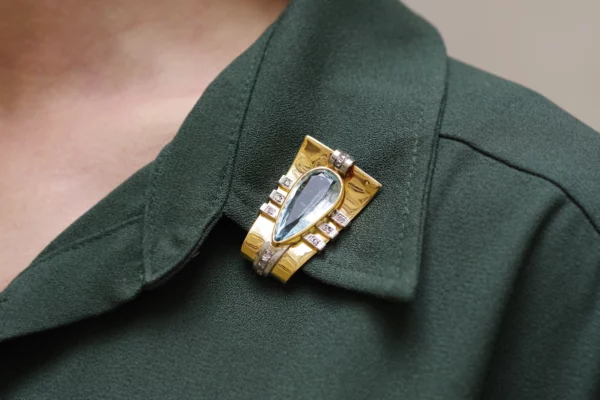 3000,00€
3000,00€Aquamarine clip brooch in 18 karat yellow gold and platinum. Retro period lapel clip in the form of a trapezoid ribbon, centered on a large pear-cut aquamarine weighing approx. 7.17 carats. The clip is decorated with platinum bands set with 13 rose-cut diamonds. Retro period lapel clip, circa 1940.
Owl and mascaron hallmarks (french state hallmark for 18 karat gold and platinum)
Dimensions: 41 mm x 26 mm
Aquamarine dimensions: 26.4 x 12 x 6.10 mm
Estimated aquamarine weight: 7.17 carats
Estimated diamond weight: 0.13 caratCondition: lightly scratched, oxidized
Weight : 15.84 gr
-
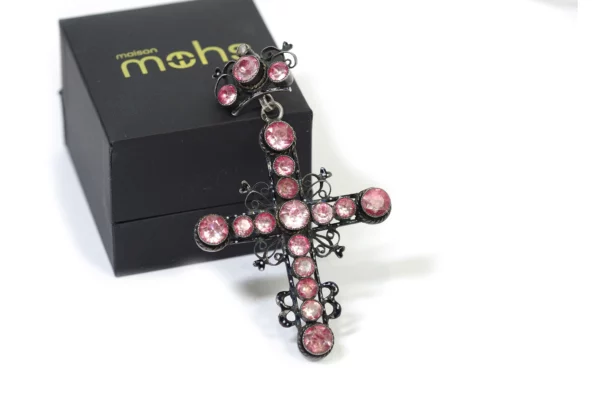
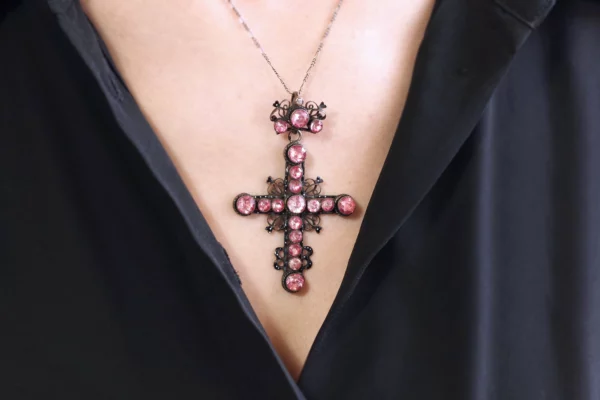 480,00€
480,00€Victorian French enamel foiled paste cross pendant in silver. This cross is in silver with filigree decoration, forming a cross adorn with paste faceted pink glasses on spangles meant to have a look of pink topaz. A black enamel decoration with white dots covers the entire pendant. A glass bead adorns the upper part of the composition. The bezels are completely closed. French work from the beginning of the 19th century
French work from the middle of the 19th century
Wild boar hallmark
Width: 4.3 cmCondition: lack of enamel, cracks.
Weight: 13.37 g
*The antique gold chain is not sold with the jewel*
See our antique chains -
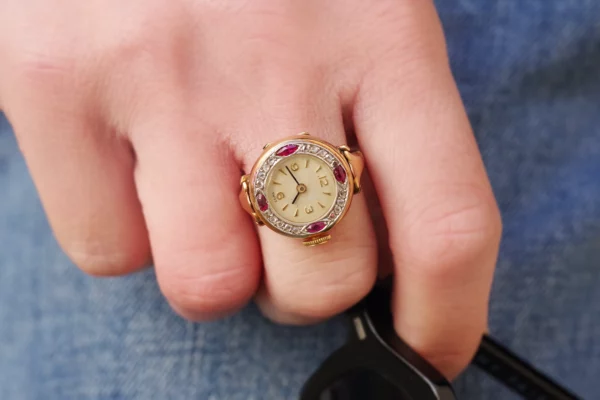
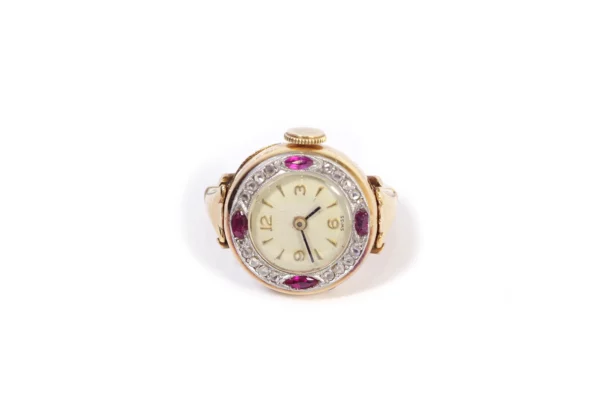 Out of Stock
1,00€
Out of Stock
1,00€Art Deco watch ring in 18 karat gold and platinum. Swiss ring watch from the Art Deco period with a round dial with Arabic numerals. The case is set with four synthetic navette rubies alternating with sixteen rose-cut diamonds set in platinum. The ring has an original spring system to […]
-
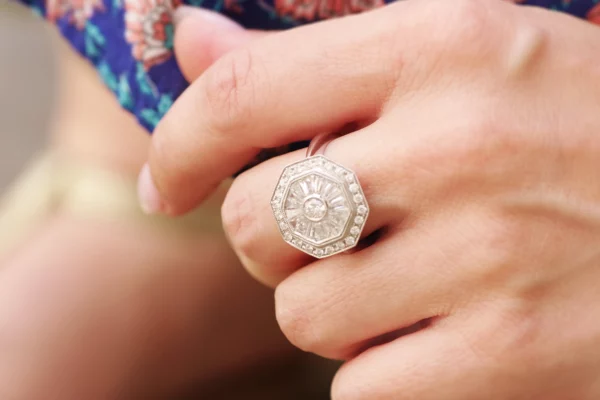
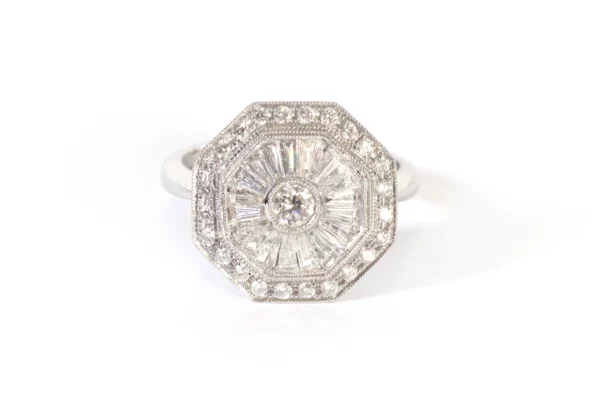 4200,00€
4200,00€Art Deco style diamond ring in white gold 18 karats. Octagonal ring entirely set with diamonds. The central brilliant cut diamond of about 0.20 carat is set in a pearl setting. The main diamond is surrounded by 20 baguette-cut and fancy diamonds forming a radiating decoration. The whole is surrounded by 24 brilliant-cut diamonds set in an octagon and highlighted by a pearl setting. The geometrical style of this ring resumes the codes of the Art Deco jewellery of the 1930s. Art Deco ring, late 20th century, France.
Eagle head hallmark, illegible goldsmith’s hallmark
Finger size : 59 UE or 8.75 US (can be changed)
Bezel size : 17 x 17.5 mm
Estimated weight of the central diamond : 0.20 carat
Total estimated weight of the diamonds : 1.45 caratCondition : scratches inside the ring
Weight : 8.3 gr
-

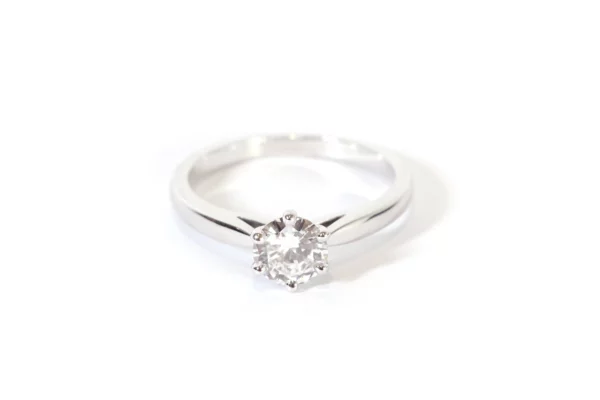 2700,00€
2700,00€Solitaire diamond 0.70 ct ring diamond set in 18-karat white gold (750 thousandths). This vintage solitaire ring is adorned with a brilliant-cut diamond held in place by six prongs, weighing exactly 0.70 carats. The ring is of French origin, dating back to circa 1990.
Eagle’s head (French hallmark for 18-karat gold).
Finger size: 54 EU or 6.75 US (resizable).
A certificate was issued by the French Gemology Laboratory on 27/07/2016, providing the following details about the diamond:
Characteristics of the diamond:
Shape-Cut: Round Brilliant
Dimensions: 6.06-6.19×3.15 mm
Weight: 0.70 carat
Color: F
Clarity: VVS2
Cut: Fair
Polish: Good
Symmetry: Good
Fluorescence: Medium
Comments: Evidence of the diamond’s rough shapeNote: The certificate from the French Gemology Laboratory can be provided upon request and will be given to the buyer.
Condition: scratches on the inside of the ring.Weight: 3.47 gr
-
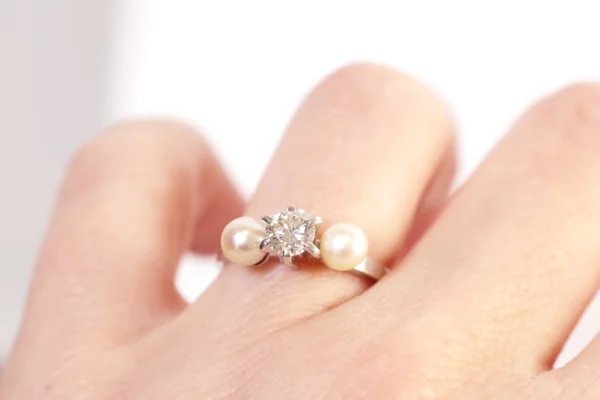
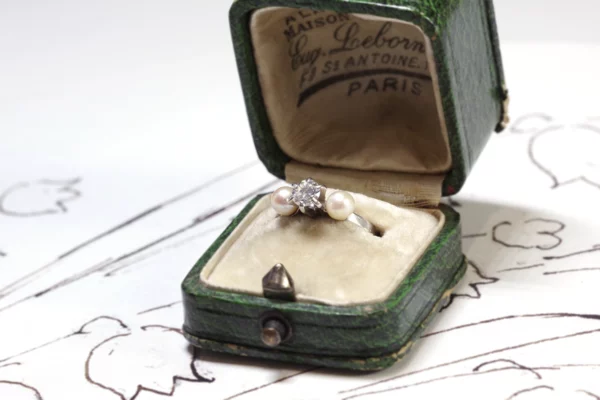 1300,00€
1300,00€Diamond pearl trilogy ring in white gold. Ring with a 0.50 carat brilliant-cut diamond framed by two 4.8 mm diameter cultured pearls. Pearls are white. Vintage ring from the 1970’s, France.
Eagle head hallmark (French state hallmark for 18-karat gold) and Wegelin goldsmith’s hallmark (company active in Grenoble since the 1920s).
Finger size: 49 UE or 4.75 US (can be changed).
Diamond characteristics
Shape-size: round-brilliant
Dimensions: 4.93-4.91×2.55 mm
Estimated mass: 0.50 carat
Estimated color: G/H
Estimated purity: VVS2
Cut: Good
Polished: Good
Symmetry: Good
Fluorescence: strong
Estimated type: IaDiameter of pearls: 4.8 mm
Condition: fine wear scratches
Weight: 2.88 gr
*The antique box is not sold with the jewel*
-
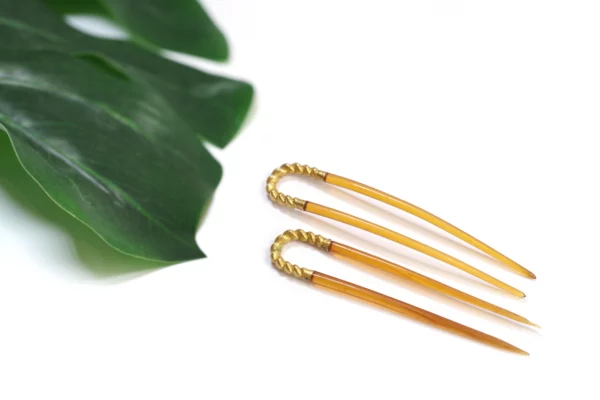
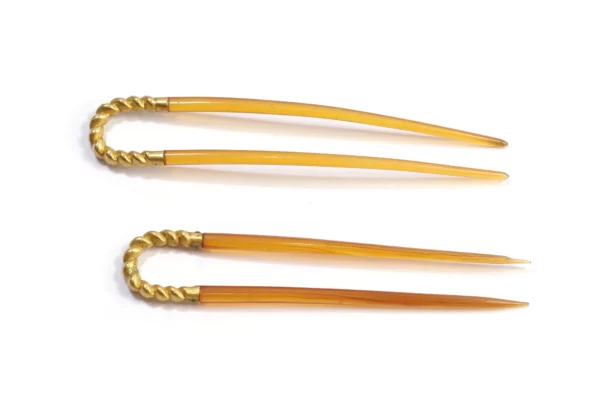 700,00€
700,00€Antique gold wedding hairpins in 18 karats gold and blond organic material. These hairpins are composed of two teeth made of blonde organic material and a twisted-effect element in 18 karat gold (750). Sold as a pair. Wedding hairpins from the late 19th century, France.
Genuine head jewels, these late 19th-century hair accessories will adorn and enhance your wedding bun, giving it a romantic final touch. These antique gold pins will be perfect for a religious event or an anniversary.
Height: 8 cm
Width: 1.5 cmNote: these pins are sold as a pair
Condition: small chip on one of the tips of one of the pinsWeight: 2.1 gr and 2 gr
A larger pair of the same model is available to complete a set of 4 hairpins (last photo).
To view them, click here.More about hairstyles: From the 19th to the 20th century, women styled their hair with “accroche-coeurs” (twists pinned to the forehead) and curls framing each side of the face. They adorned their hairstyles with combs, flowers, leaves, or ribbons adorned with jewelry.
Crédits photographiques Inès Tano
-
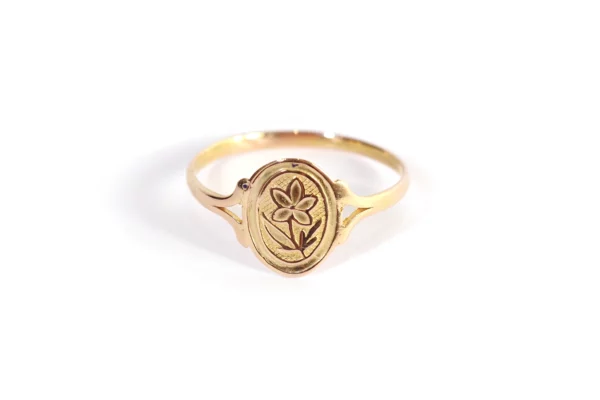
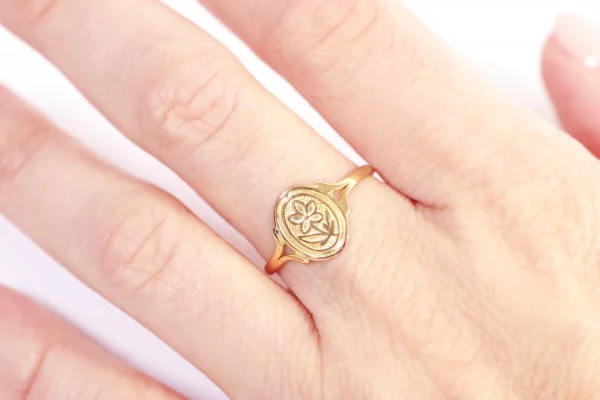 480,00€
480,00€French Victorian pansy ring in 18 karat gold. Antique ring decorated with a pansy in an oval cartouche. Usually, these rings were decorated with multicolored enamels, but these have disappeared. Regional ring, Poitou region, circa 1860, France.
Partially erased horsehead hallmark (french state hallmark for 18 karat gold)
Design size: 10 x 9 mm
Finger circumference: 54.5 UE or 7 US (possible sizing)
Condition: slight wear scratches, enamel decoration missing.
Weight : 1.09 gr

